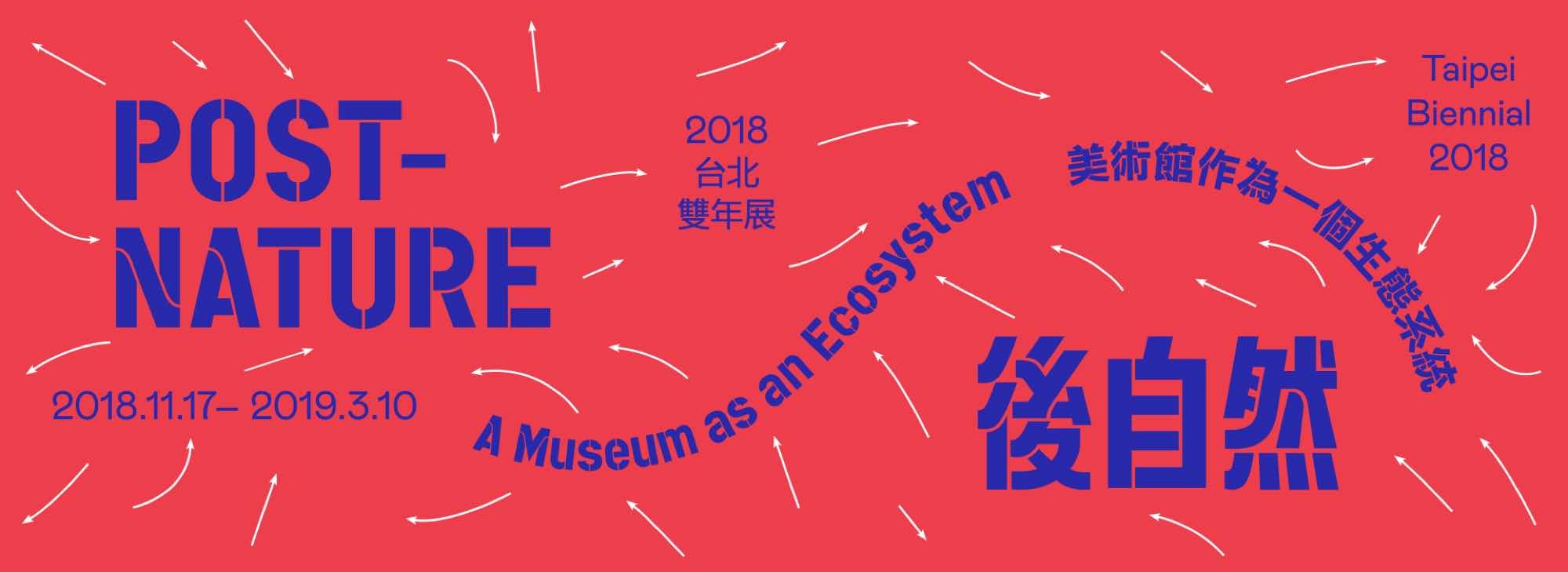Taipei Biennial 2018
Post-Nature—A Museum as an Ecosystem
17 Nov 2018 - 10 Mar 2019
Curated by Mali Wu and Francesco Manacorda, the Taipei Biennial 2018 officially announces its title: Post-Nature—A Museum as an Ecosystem. Taking this title as their starting point, the curators approach the ever-changing nature of an ecosystem and how this is reflected in artistic and institutional practice. This exhibition will investigate how systemic theory can inform art making and allow for reflections about our environment, underlining the reciprocal dependency which every system relies upon to survive.
Post-Nature—A Museum as an Ecosystem combines the notion of ecosystemic survival and the structure of interdependency in its very form. Here, the museum and the city that surrounds it are recognised as interlocking structures. The exhibition will explore, illustrate and investigate the different modes of connectivity and reciprocal dependency that keep a system alive. In this biennial, all artistic, theoretical, social and political elements will contribute to an overarching view of how an ecosystem is generated, and how it regenerates, through collaboration among parts and adaptation to change.
—Post-Nature—A Museum as an Ecosystem curatorial statement
In Post-Nature—A Museum as an Ecosystem, the curators use the exhibition to reconsider the museum as a model. In their most conventional forms, exhibitions grow quickly, occupy a limited time span, and have little ability to sustain their reach, while museums instead develop slowly and organically, respond carefully to their environments and preserve their own longevity. At the same time, if too rigidly confined by an architectural and conceptual framework, a museum can become an isolated space for art contemplation, rather than remain open to constant ecosystemic transformation, osmosis and growth.
As outlined in the curatorial statement, Post-Nature—A Museum as an Ecosystem engage with different ecosystemic models, focusing particularly on the significance of reciprocal dependency, and how this form of working tends toward a holistic common good. While the exhibition venue, Taipei Fine Arts Museum, act as the central nervous system of the Taipei Biennial, the experimental methodology of this biennial transform the museum into a platform for multi-disciplinary discussion, which intends to extend outward and reach multilateral resonance outside of the architectural limits of the exhibition.
The list of participants and participating groups are: Ruangsak ANUWATWIMON; Martha ATIENZA; AU Sow-Yee; Ursula BIEMANN; Alexey BULDAKOV; Huai-Wen CHANG+MAS Micro Architecture Studio; Ting-Tong CHANG; Jui-Kuang CHAO+Tainan Community University; Julian CHARRIÈRE; CHEN Chu-Yin+Solar Insects Vivarium Workshop; Lucy DAVIS; ET@T; Laila Chin-Hui FAN; Futurefarmers; Tue GREENFORT; Ingo GÜNTHER; Henrik HÅKANSSON; Helen Mayer HARRISON & Newton HARRISON; Jeffrey HOU & Dorothy TANG; HSIAO Sheng-Chien; HUANG Hsin-Yao; Indigenous Transitional Justice Class, Taiwan; KE Chin-Yuan + “Our Island”; KHVAY Samnang; Kuroshio Ocean Education Foundation; Candice LIN; Zo LIN—Weed Day; Duane LINKLATER; Nicholas MANGAN; Jumana MANNA; Museum of Nonhumanity; Mycelium Network Society; Open Green; Allan SEKULA; Rachel SUSSMAN; Vivian SUTER; Keelong River Watch Union; The Thousand Miles Trail Association; WU Ming-Yi; Robert ZHAO Renhui and ZHENG Bo. (In alphabetical order)
Post-Nature—A Museum as an Ecosystem combines the notion of ecosystemic survival and the structure of interdependency in its very form. Here, the museum and the city that surrounds it are recognised as interlocking structures. The exhibition will explore, illustrate and investigate the different modes of connectivity and reciprocal dependency that keep a system alive. In this biennial, all artistic, theoretical, social and political elements will contribute to an overarching view of how an ecosystem is generated, and how it regenerates, through collaboration among parts and adaptation to change.
—Post-Nature—A Museum as an Ecosystem curatorial statement
In Post-Nature—A Museum as an Ecosystem, the curators use the exhibition to reconsider the museum as a model. In their most conventional forms, exhibitions grow quickly, occupy a limited time span, and have little ability to sustain their reach, while museums instead develop slowly and organically, respond carefully to their environments and preserve their own longevity. At the same time, if too rigidly confined by an architectural and conceptual framework, a museum can become an isolated space for art contemplation, rather than remain open to constant ecosystemic transformation, osmosis and growth.
As outlined in the curatorial statement, Post-Nature—A Museum as an Ecosystem engage with different ecosystemic models, focusing particularly on the significance of reciprocal dependency, and how this form of working tends toward a holistic common good. While the exhibition venue, Taipei Fine Arts Museum, act as the central nervous system of the Taipei Biennial, the experimental methodology of this biennial transform the museum into a platform for multi-disciplinary discussion, which intends to extend outward and reach multilateral resonance outside of the architectural limits of the exhibition.
The list of participants and participating groups are: Ruangsak ANUWATWIMON; Martha ATIENZA; AU Sow-Yee; Ursula BIEMANN; Alexey BULDAKOV; Huai-Wen CHANG+MAS Micro Architecture Studio; Ting-Tong CHANG; Jui-Kuang CHAO+Tainan Community University; Julian CHARRIÈRE; CHEN Chu-Yin+Solar Insects Vivarium Workshop; Lucy DAVIS; ET@T; Laila Chin-Hui FAN; Futurefarmers; Tue GREENFORT; Ingo GÜNTHER; Henrik HÅKANSSON; Helen Mayer HARRISON & Newton HARRISON; Jeffrey HOU & Dorothy TANG; HSIAO Sheng-Chien; HUANG Hsin-Yao; Indigenous Transitional Justice Class, Taiwan; KE Chin-Yuan + “Our Island”; KHVAY Samnang; Kuroshio Ocean Education Foundation; Candice LIN; Zo LIN—Weed Day; Duane LINKLATER; Nicholas MANGAN; Jumana MANNA; Museum of Nonhumanity; Mycelium Network Society; Open Green; Allan SEKULA; Rachel SUSSMAN; Vivian SUTER; Keelong River Watch Union; The Thousand Miles Trail Association; WU Ming-Yi; Robert ZHAO Renhui and ZHENG Bo. (In alphabetical order)

